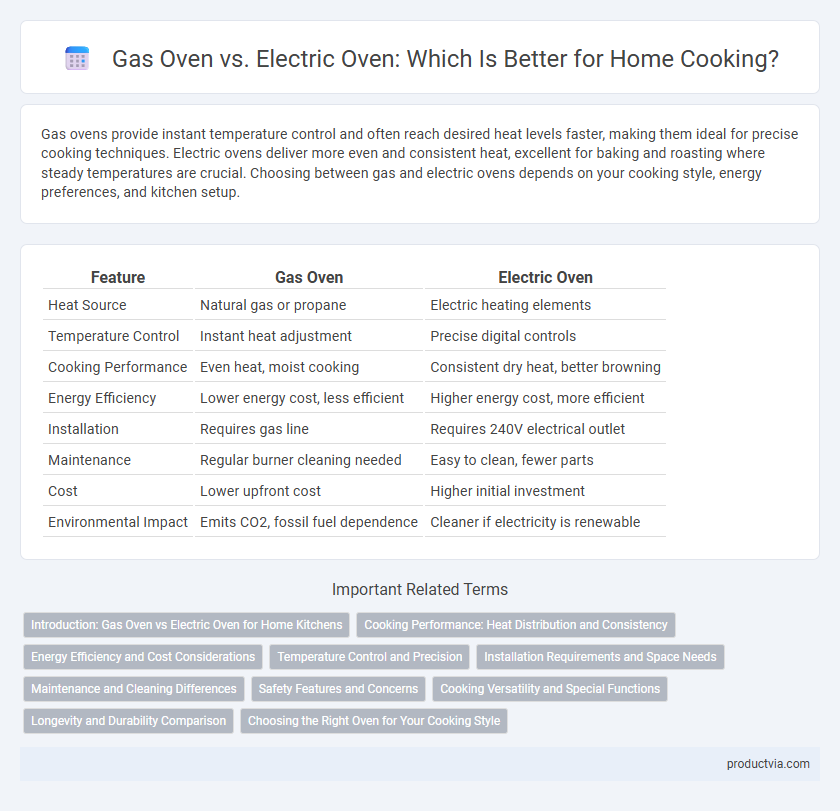Gas ovens provide instant temperature control and often reach desired heat levels faster, making them ideal for precise cooking techniques. Electric ovens deliver more even and consistent heat, excellent for baking and roasting where steady temperatures are crucial. Choosing between gas and electric ovens depends on your cooking style, energy preferences, and kitchen setup.
Table of Comparison
| Feature | Gas Oven | Electric Oven |
|---|---|---|
| Heat Source | Natural gas or propane | Electric heating elements |
| Temperature Control | Instant heat adjustment | Precise digital controls |
| Cooking Performance | Even heat, moist cooking | Consistent dry heat, better browning |
| Energy Efficiency | Lower energy cost, less efficient | Higher energy cost, more efficient |
| Installation | Requires gas line | Requires 240V electrical outlet |
| Maintenance | Regular burner cleaning needed | Easy to clean, fewer parts |
| Cost | Lower upfront cost | Higher initial investment |
| Environmental Impact | Emits CO2, fossil fuel dependence | Cleaner if electricity is renewable |
Introduction: Gas Oven vs Electric Oven for Home Kitchens
Gas ovens offer precise temperature control and rapid heat adjustments, making them ideal for recipes requiring quick temperature changes. Electric ovens provide even heat distribution and consistent baking results, favored for baking delicate pastries and breads. Home cooks often choose based on cooking style, energy costs, and kitchen setup preferences.
Cooking Performance: Heat Distribution and Consistency
Gas ovens provide rapid heat adjustments and moist heat, allowing for efficient searing and roasting but may have uneven heat distribution due to flame positioning. Electric ovens offer more consistent and even heat distribution with radiant heating elements, ideal for baking and delicate dishes requiring precise temperature control. Home cooks often prefer electric ovens for steady results, while gas ovens excel in versatility and quick temperature changes.
Energy Efficiency and Cost Considerations
Gas ovens typically offer lower operating costs due to natural gas prices being cheaper than electricity in many regions, making them more energy-efficient for long cooking periods. Electric ovens provide more consistent and even heat distribution, which can reduce cooking times and improve energy use efficiency despite higher electricity costs. Homeowners should weigh initial appliance costs, fuel prices, and cooking habits to determine the most cost-effective and energy-efficient option for their kitchens.
Temperature Control and Precision
Gas ovens offer rapid temperature adjustments and visual flame feedback, providing intuitive control for home cooking. Electric ovens maintain more consistent heat with precise temperature settings, ideal for recipes requiring steady, even cooking. Home cooks seeking exact temperature control often prefer electric ovens for their reliability and accuracy.
Installation Requirements and Space Needs
Gas ovens require a natural gas line installation and proper ventilation, which may involve professional setup and adherence to local safety codes, impacting overall installation complexity. Electric ovens demand a dedicated electrical circuit with adequate amperage, often necessitating upgrades to home wiring to support high power consumption safely. Space needs for both ovens are similar, but gas ovens might need extra clearance around the gas connection and ventilation system, while electric ovens primarily require standard countertop or cabinet space.
Maintenance and Cleaning Differences
Gas ovens require regular inspection of burners and pilot lights to prevent clogging and ensure efficient combustion, while electric ovens primarily need coil and element checks for safety. Cleaning gas ovens often involves careful removal of burner components to avoid damage, whereas electric ovens benefit from self-cleaning cycles or easy wipe-down surfaces. Moisture and grease buildup management differs; gas ovens may retain more residue around burners, while electric ovens typically experience fewer nooks for dirt accumulation.
Safety Features and Concerns
Gas ovens require proper ventilation and regular maintenance to prevent gas leaks and carbon monoxide buildup, posing safety concerns if not properly managed. Electric ovens offer safer operation with built-in automatic shut-off features and lower risk of gas-related hazards but may present electrical shock risks if wiring is faulty. Home cooks prioritize choosing ovens with reliable safety certifications and integrated sensors for flame failure and overheating detection to ensure safe use.
Cooking Versatility and Special Functions
Gas ovens offer precise temperature control and rapid heat adjustments, making them ideal for recipes requiring quick changes in heat intensity. Electric ovens provide consistent and even heat distribution with advanced features like convection cooking, self-cleaning modes, and digital controls, enhancing cooking versatility. Special functions such as broiling, baking, and roasting tend to be more efficiently executed in electric ovens due to their steady heating elements and programmable settings.
Longevity and Durability Comparison
Gas ovens typically offer greater longevity due to their simpler mechanical components and fewer electronic parts, making them less prone to malfunction over time. Electric ovens, although equipped with advanced digital features, may experience wear in heating elements and electronic controls, potentially reducing their lifespan. Proper maintenance can extend the durability of both types, but gas ovens generally withstand heavy use longer in home cooking environments.
Choosing the Right Oven for Your Cooking Style
Gas ovens provide precise temperature control and quick heat adjustments, ideal for recipes requiring rapid changes in cooking conditions. Electric ovens offer consistent and even heat distribution, making them suitable for baking delicate pastries and casseroles. Selecting the right oven depends on your cooking style: gas ovens excel in broiling and roasting, while electric ovens deliver reliable results for baking and slow cooking.
Gas oven vs Electric oven for home cooking Infographic

 productvia.com
productvia.com